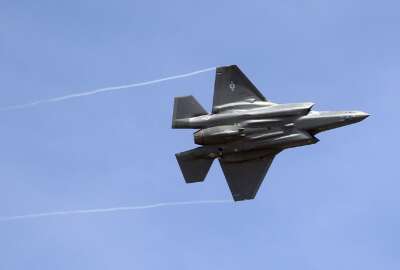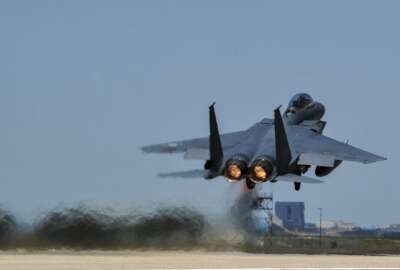
Goldfein tries to justify press crackdown, says Air Force still obligated to talk to public
The Air Force says it gave its public affairs officers new training to deal with the new threat environment.
After a surprise Air Force memo went out earlier this month directing the service to stay tight lipped on operational details to the press, Chief of Staff Gen. David Goldfein says public affairs officers received new training on dealing with journalists.
“We’ve done some very significant training not only with our public affairs, but also with our commander,” Goldfein said during a March 29 Defense Writers Group breakfast in Washington.
Goldfein said the Air Force needed to change the way it interacts with the press due to the changing threat climate.
“We are coming out of 17 years of conflict where we really haven’t been in the great power competition game and so therefore we have been a little looser on the things we talk about and then we as an Air Force had three of four instances in a row where we just skirted the edge. We just got to the point where the secretary [of the Air Force] and I were just uncomfortable about the operational details we were talking about,” Goldfein said.
He added in a world of violent extremists those details were not an issue, but under the new Defense strategy focusing on near-peer competitors like China and Russia, the Air Force needs to be more careful.
One of the stories the Air Force said “skirted” the edge included an article by The Denver Post that released information about a space operations center, identifying it as a hub of critical data. However, the Air Force had already put out a press release about the center a month before the article was released.
The Air Force’s decision to crack down on what it reveals to the press came with strict bans on new interviews with media related to operational matters and even makes participation in community, band and public engagements subject to headquarters approval.
Goldfein tried to soften that tone.
“It’s always a balancing act. We have an obligation to speak to the American people and tell them what’s going on. We have an obligation to speak to [the press]. We take that obligation seriously and so hopefully what [the press] will report back to me is that there will be no difference because that obligation has not changed,” Goldfein said.
Transparency and journalism groups aren’t convinced.
“[It is] really troubling because we know the Air Force is confronting a number of problems and the best way, usually, to get those problems fixed is to be transparent about them both to the public and to Congress,” Mandy Smithberger, director of the CDI Straus Military Reform Project at the Project on Government Oversight, told Federal News Radio.
John Donnelly, the president of the Military Reporters and Editors Association, a group that represents about 300 journalists, public affairs professionals and academics who focus on national security, said the military has a responsibility to safeguard classified information, and even some unclassified information.
“But security must be balanced against the need to inform the public,” he said. “We worry that the definition of the kind of unclassified information that can be withheld is subjective. Given the ambiguity about what’s allowed and the message from the top stressing secrecy, officials who are wary about their careers may err on the side of withholding information. And in a worst case scenario, such guidance could be used to justify keeping out of public view data that may simply be embarrassing to the Air Force but that the U.S. citizenry needs to know. When it comes to unclassified information, the presumption in a democracy should favor disclosure. Ultimately, the proof will be in the execution of this new guidance, and MRE will be closing watching that.”
Adam Marshall, a Knight Foundation litigation attorney at the Reporters Committee for the Freedom of the Press, also found the emerging Air Force public affairs policies worrying.
“When press access is restricted, it’s the public that loses out the most by having less information about what its government and military are doing,” Marshall said. “Reducing journalists’ access to the people, places, and sources of information that contribute to complete, accurate reporting is not the way to strike the balance between national security and a free press.”
Copyright © 2025 Federal News Network. All rights reserved. This website is not intended for users located within the European Economic Area.
Scott Maucione is a defense reporter for Federal News Network and reports on human capital, workforce and the Defense Department at-large.
Follow @smaucioneWFED
Related Stories





